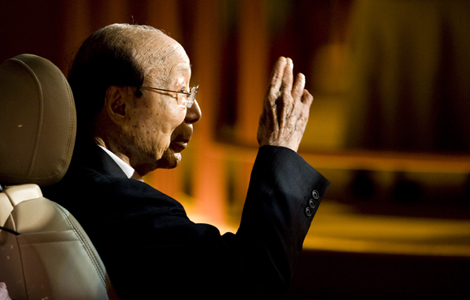Will China dominate the world?
Updated: 2014-01-19 23:20
(China Daily)
|
|||||||||||
"We are now in an era in which people are writing forward projections about China based on the reality that the supercharged economic growth of the last decade is behind us.
"China will continue to grow but at a moderate pace and I think people have adjusted their geopolitical lenses to take account of that fact."
Mitter, who has just made a BBC radio documentary, Shanghai World Redux, about the new confidence of China's second city which will air later this month, says the 100th anniversary of the outbreak of World War I brings home how difficult it is to make long-term forecasts.
"If the 20th century is any guide, then what happened at the beginning was not actually a predictor of what happened at the end," he says.
"I think the trends we have seen over the past 10 or 15 years of China's big population becoming more prosperous, more confident and more international show no signs of reversing and I think this will continue for many decades to come."
Martin Jacques, the British academic and author who made seven visits to China last year, stands behind his view that China will be an increasingly dominant force as the century progresses economically, politically and culturally.
"Of course China has lots of problems and it has been up against many of these since reform and opening-up began in the late 1970s. They have, however, been extraordinarily good at overcoming them."
The former deputy editor of The Independent newspaper and editor of Marxism Today, rejects some of the new China realism as being overly pessimistic.
"I think a lot of China writers just have this huge difficulty. If you look at this period since China's rise started, you got this bearish sentiment from Western experts that it was all going to come to an end," he says.
"I think the fundamental reason for this skepticism is that they cannot come to terms with a country that is so alien in political and other terms to the West has pioneered a different and successful way for itself."
Edward Tse, chairman emeritus, Greater China, of international management consultants Booz & Co, who is shortly to launch his own new consultancy, Gao Feng Advisory, believes Fenby underestimates the transformation now taking place in the Chinese economy.
He agrees the private sector has been held back by the dominance of the State-owned industries but that the story of the next few decades will be the unleashing of China's entrepreneurs on the global stage.
"That the Chinese economy is dominated by State-owned enterprises and the government plays a heavy role in industry is true but I think the future will be different. I think that will belong to Chinese entrepreneurs. I think that is something that people in the West underestimate and under-appreciate."
Tse, also author of The China Challenge: Harnessing the Power of the World's Fastest-Growing Economy, describes the recognition of market forces at the Third Plenum of the Central Committee of the Communist Party in November as "monumental".
He believes the next decade will see major outward investment such as Shuanghui International Holding Ltd's recent $4.7 billion acquisition of Smithfield Foods Inc in the US.
"We are going to see more and more Chinese companies looking to build their own capability and address their problems of lack of innovation or skills by making acquisitions," he says.
In terms of foreign policy, Hugh White, author of The China Choice: Why We Should Share Power, one of last year's critically acclaimed China books, says China's rise will change the dynamics.
from page 13
"There is not much doubt that China will quite soon displace the US as the world's richest country and, eventually, in some measure at least, the strongest. But that does not mean the 21st century will be the ‘Chinese Century' in the way the 20th century has been the ‘American Century'," he says.
"Even as the world's richest country, China will still face many other rich and powerful states around the globe. So rather than dominating, it will be one of a number of great powers whose views must be respected. How that will work is one of the great global questions for coming years."
White, a former adviser to the former Australian prime minister Bob Hawke, says the biggest question is China's role in Asia following recent tensions with Japan.
"China's rise changes Asia's political order fundamentally and ensures China a much bigger role than it has had for the past two centuries. But even in Asia it will face other formidable powers, including Japan, America and India. China will find it hard to dominate Asia in the way that America has done until now "
Mitter, also author of China's War With Japan, 1937-1945: The Struggle for Survival, says China is still mainly concerned with its own backyard rather than attempting to be a global superpower.
"I think a good metaphor is concentric circles. There is no doubt that China will want to play a role in its own region but, as the circles go outwards, its policy becomes less clear."
For Shambaugh, China's diplomacy has shown signs of improving since he wrote China Goes Global, which is set to be published in Chinese this year, with improvements in relations with Southeast Asia and the US.
He maintains, however, that his book was a timely counterpoint to all the books that presented a too-optimistic view of China.
"I recently counted the number of books on my own bookshelf with ‘China' and ‘rise' in their titles and I have about 25."
He says China still has major challenges if it wants to dominate the century and, in particular, with so-called soft power with few countries in the world wanting to emulate or be like China.
"My findings about China's continuing difficulties in gaining soft power abroad continue. China's continued ambivalence about global governance are also very apparent," he says.
Kerry Brown, executive director of the China Studies Centre at the University of Sydney, says he is unconvinced whether the issue of China dominating the world is now the debate to be had.
"I am not entirely sure that this idea of the 21st century belonging to anyone in particular makes much sense. I thought the idea of nation states being the great drivers of all developments was coming to a slow end," he says.
"Of course, China will play a major role in the coming years, but it has so many challenges to face within itself that it is hard to see it being liberated from these internal preoccupations any time soon."
Tse at Booz & Co insists China still retains a very solid economic base on which to build.
"People say that China has lost its low cost manufacturing advantage. Manufacturing is actually not just a labor costs issue. It is not the case also that all advanced manufacturing will be done in the US and not China. China has huge manufacturing advantages with its supply chains and efficiencies that it can leverage."
He also says that it will not be long before China has its own global brands that will challenge those in the West.
"I think things like WeChat (a China Internet social service already successful in countries such as India) has the potential to become globally recognized. There are also a number of other Chinese brands that have already made their mark such as (telecommunications company) Huawei and Lenovo in computers. I think most of China's future strong brands will come from the private sector."
Mitter at Oxford believes there is often a failure to detect a new self-confidence in China, particularly among the middle class in cities such as Shanghai.
"You have this figure that some 60 percent of Americans don't have a passport and have no intention of traveling abroad. You could contrast this with China's middle class being very outward looking. People in Shanghai now regard internationalism and cosmopolitanism as part of their own make up," he says.
"They would be the first to concede that this is not an attitude coming from a farming background in the center of Ningxia (Hui autonomous region)."
Jacques argues there is still a failure in the West to recognize the challenge that China now poses.
He says many commentators are still locked into a mentality that the West will always rule since that has been the case since Britain became the first industrial nation more than 200 years ago.
"Their greatest single problem facing the West this century is to stop looking down on China from a Western perspective rather than actually trying to understand it. I think Westerners are going to find it extremely difficult because for the last 200 years they have never really had to think about any culture being dominant other than their own."
Contact the writer at andrewmoody@chinadaily.com.cn
Related Stories
China in the eyes of the world 2014-01-17 19:31
China overtakes EU as top export market for Singapore 2014-01-17 16:34
Xi calls for early signing of China-Gulf FTA 2014-01-18 07:53
China to step up efforts to find peace in South Sudan 2014-01-18 07:52
Pressure rises on treating China's pollution 2014-01-18 03:04
China extends Sino-US antiques import restriction 2014-01-17 21:05
Today's Top News
Xi writes to Chinese in German colleges
China software to rival Android
Will China dominate the world?
Mainland policy lures HK students
Obama tells Germans he will not wiretap
Party is over for SOEs conferences
Egypt referendum wins support
Home prices continue to climb
Hot Topics
Lunar probe , China growth forecasts, Emission rules get tougher, China seen through 'colored lens', International board,
Editor's Picks

|

|

|

|

|

|





